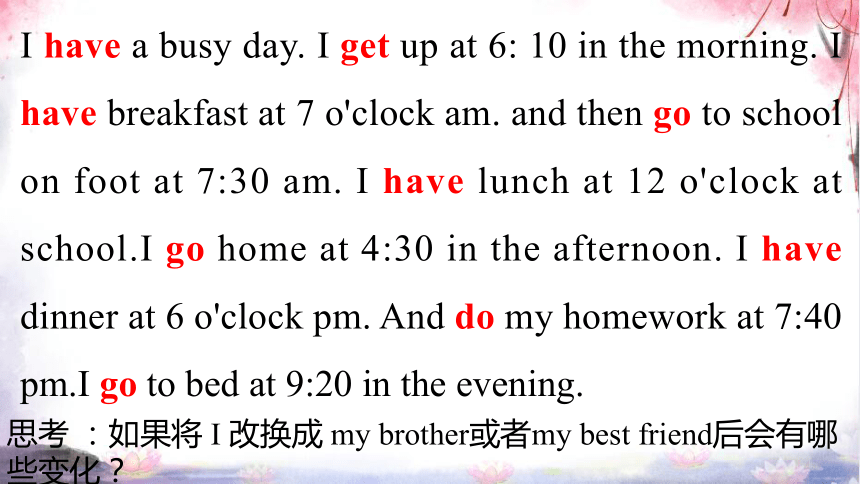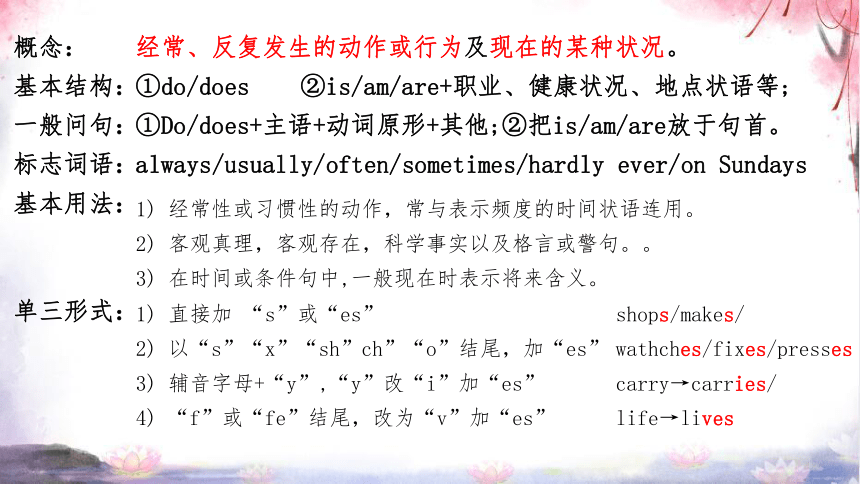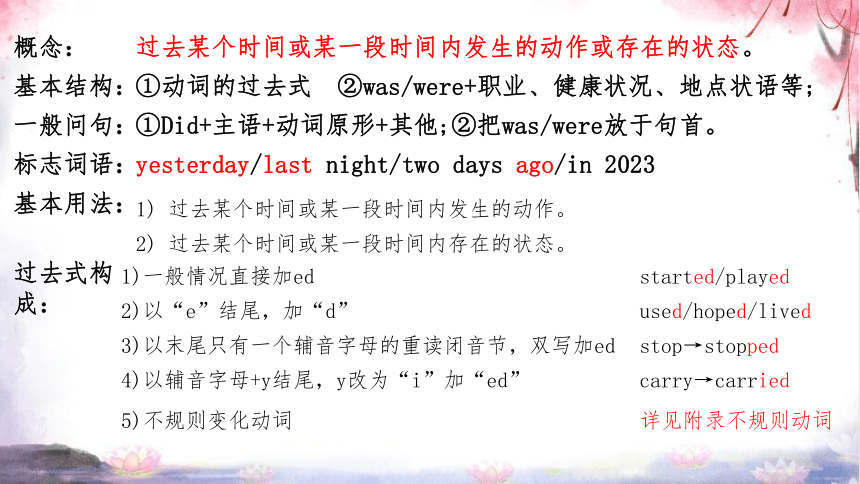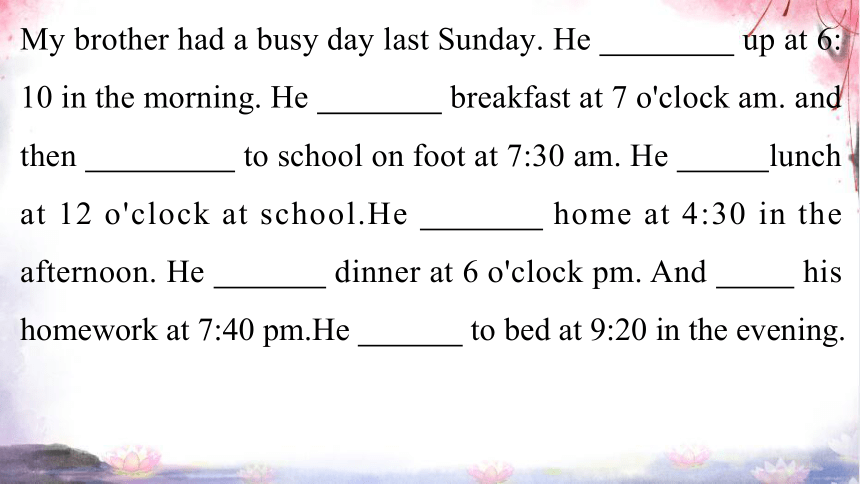【备考2024】中考英语专题 一文读懂四种基本时态 课件+视频(一般现在时+一般过去时+一般将来时+现在完成时)
文档属性
| 名称 | 【备考2024】中考英语专题 一文读懂四种基本时态 课件+视频(一般现在时+一般过去时+一般将来时+现在完成时) |

|
|
| 格式 | pptx | ||
| 文件大小 | 241.9MB | ||
| 资源类型 | 试卷 | ||
| 版本资源 | 通用版 | ||
| 科目 | 英语 | ||
| 更新时间 | 2024-05-28 00:00:00 | ||
图片预览









文档简介
(共20张PPT)
一文读懂四种基本时态
一般现在时 一般过去时 一般将来时 现在完成时
【备考2024】
I have a busy day. I get up at 6: 10 in the morning. I have breakfast at 7 o'clock am. and then go to school on foot at 7:30 am. I have lunch at 12 o'clock at school.I go home at 4:30 in the afternoon. I have dinner at 6 o'clock pm. And do my homework at 7:40 pm.I go to bed at 9:20 in the evening.
思考 :如果将 I 改换成 my brother或者my best friend后会有哪些变化?
概念:
经常、反复发生的动作或行为及现在的某种状况。
基本结构:
①do/does ②is/am/are+职业、健康状况、地点状语等;
一般问句:
①Do/does+主语+动词原形+其他;②把is/am/are放于句首。
标志词语:
always/usually/often/sometimes/hardly ever/on Sundays
基本用法:
单三形式:
1) 经常性或习惯性的动作,常与表示频度的时间状语连用。
2) 客观真理,客观存在,科学事实以及格言或警句。。
3) 在时间或条件句中,一般现在时表示将来含义。
1) 直接加 “s”或“es”
2) 以“s”“x”“sh”ch”“o”结尾,加“es”
3) 辅音字母+“y”,“y”改“i”加“es”
4) “f”或“fe”结尾,改为“v”加“es”
shops/makes/
wathches/fixes/presses
carry→carries/
life→lives
My brother a busy day. He up at 6: 10 in the morning. He breakfast at 7 o'clock am. and then to school on foot at 7:30 am. He lunch at 12 o'clock at school.He home at 4:30 in the afternoon. He dinner at 6 o'clock pm. And his homework at 7:40 pm.He to bed at 9:20 in the evening.
has
gets
has
goes
has
gets
has
does
goes
My brother has a busy day. He gets up at 6: 10 in the morning. He has breakfast at 7 o'clock am. and then goes to school on foot at 7:30 am. He has lunch at 12 o'clock at school.He goes home at 4:30 in the afternoon. He has dinner at 6 o'clock pm. And does his homework at 7:40 pm.He goes to bed at 9:20 in the evening.
思考 :如果讲述My brother上周度过了一个繁忙的一天,文中动词又后会有哪些变化?
概念:
过去某个时间或某一段时间内发生的动作或存在的状态。
基本结构:
①动词的过去式 ②was/were+职业、健康状况、地点状语等;
一般问句:
①Did+主语+动词原形+其他;②把was/were放于句首。
标志词语:
yesterday/last night/two days ago/in 2023
基本用法:
过去式构成:
1) 过去某个时间或某一段时间内发生的动作。
2) 过去某个时间或某一段时间内存在的状态。
2)以“e”结尾,加“d”
3)以末尾只有一个辅音字母的重读闭音节,双写加ed
4)以辅音字母+y结尾,y改为“i”加“ed”
started/played
used/hoped/lived
stop→stopped
carry→carried
1)一般情况直接加ed
5)不规则变化动词
详见附录不规则动词
My brother had a busy day last Sunday. He up at 6: 10 in the morning. He breakfast at 7 o'clock am. and then to school on foot at 7:30 am. He lunch at 12 o'clock at school.He home at 4:30 in the afternoon. He dinner at 6 o'clock pm. And his homework at 7:40 pm.He to bed at 9:20 in the evening.
I had a busy day last Wednesday. I got up at 6: 10 in the morning. I had breakfast at 7 o'clock am. and then went to school on foot at 7:30 am. I had lunch at 12 o'clock at school.I went home at 4:30 in the afternoon. I had dinner at 6 o'clock pm. And did my homework at 7:40 pm.I went to bed at 9:20 in the evening.
I had a busy day last Wednesday. I got up at 6: 10 in the morning. I had breakfast at 7 o'clock am. and then went to school on foot at 7:30 am. I had lunch at 12 o'clock at school.I went home at 4:30 in the afternoon. I had dinner at 6 o'clock pm. And did my homework at 7:40 pm.I went to bed at 9:20 in the evening.
思考 :如果要表达My brother下周三将要度过一个繁忙的一天,文中动词又后会有哪些变化?
概念:
未来某个时间或某一段时间内发生的动作或存在的状态。
基本结构:
①will+动词原形 ②be going to + 动词原形
一般问句:
①will+主语+动词原形+其他;②把be(is,am,are)放于句首。
标志词语:
tomorrow/next night/in two days/in 2025
基本用法:
特殊用法:
1) 未来某个时间或某一段时间内发生的动作。
2) 未来某个时间或某一段时间内存在的状态。
表示位置移动等瞬时性动词,用现在进行时结构表示“将要...”
如:The dog is dying.
Look! The subway is comeing.
这只狗要死了
当心!地铁要来了。
The Greens are leaving.
格林一家人将要离开了。
如:The dog is dying.
Look! The subway is comeing.
这只狗要死了
当心!地铁要来了。
The Greens are leaving.
My brother had a busy day last Sunday. He up at 6: 10 in the morning. He breakfast at 7 o'clock am. and then to school on foot at 7:30 am. He lunch at 12 o'clock at school.He home at 4:30 in the afternoon. He dinner at 6 o'clock pm. And his homework at 7:40 pm.He to bed at 9:20 in the evening.
I will have a busy day next Wednesday. I will get up at 6: 10 in the morning. I will have breakfast at 7 o'clock am. and then I will go to school on foot at 7:30 am. I will have lunch at 12 o'clock at school.I will go home at 4:30 in the afternoon. I will have dinner at 6 o'clock pm. And I will do my homework at 7:40 pm.I will go to bed at 9:20 in the evening.
I had a busy day last Wednesday. I got up at 6: 10 in the morning. I had breakfast at 7 o'clock am. and then went to school on foot at 7:30 am. I had lunch at 12 o'clock at school.I went home at 4:30 in the afternoon. I had dinner at 6 o'clock pm. And did my homework at 7:40 pm.I went to bed at 9:20 in the evening.
思考 :如果要表达My brother近段时间以来都过着忙忙碌碌的日子,文中动词又后会有哪些变化?
概念:
①过去发生的动作一直延续到现在。②过去发生的事影响到现在
基本结构:
have / has + 过去分词
一般问句:
Have / Has+主语+过去分词+其他?
标志词语:
since + 过去时间;for + 一段时间;already;yet等
基本用法:
特殊用法:
1) 过去发生的动作一直延续到现在。
2) 过去发生的事影响到现在。
短暂性(瞬时性)动词,不能和since + 过去时间;for + 一段时间等表示一段时间的短语连用
His grandpa has died for 15 years.
His grandpa has been dead for 15 years.
他爷爷死了15年了。
过去分词的构成:
2)以“e”结尾,加“d”
3)以末尾只有一个辅音字母的重读闭音节,双写加ed
4)以辅音字母+y结尾,y改为“i”加“ed”
started/played
used/hoped/lived
stop→stopped
carry→carried
1)一般情况直接加ed
5)不规则变化动词
详见附录不规则动词
My brother had a busy day last Sunday. He up at 6: 10 in the morning. He breakfast at 7 o'clock am. and then to school on foot at 7:30 am. He lunch at 12 o'clock at school.He home at 4:30 in the afternoon. He dinner at 6 o'clock pm. And his homework at 7:40 pm.He to bed at 9:20 in the evening.
I have had a busy day for many days. I have got up at 6: 10 in the morning.I have had breakfast at 7 o'clock am. and I then have gone to school on foot at 7:30 am. I have had lunch at 12 o'clock at school.I have gone home at 4:30 in the afternoon. I have had dinner at 6 o'clock pm.And I have done my homework at 7:40 pm.I have gone to bed at 9:20 in the evening.
一文读懂四种基本时态
一般现在时 一般过去时 一般将来时 现在完成时
【备考2024】
I have a busy day. I get up at 6: 10 in the morning. I have breakfast at 7 o'clock am. and then go to school on foot at 7:30 am. I have lunch at 12 o'clock at school.I go home at 4:30 in the afternoon. I have dinner at 6 o'clock pm. And do my homework at 7:40 pm.I go to bed at 9:20 in the evening.
思考 :如果将 I 改换成 my brother或者my best friend后会有哪些变化?
概念:
经常、反复发生的动作或行为及现在的某种状况。
基本结构:
①do/does ②is/am/are+职业、健康状况、地点状语等;
一般问句:
①Do/does+主语+动词原形+其他;②把is/am/are放于句首。
标志词语:
always/usually/often/sometimes/hardly ever/on Sundays
基本用法:
单三形式:
1) 经常性或习惯性的动作,常与表示频度的时间状语连用。
2) 客观真理,客观存在,科学事实以及格言或警句。。
3) 在时间或条件句中,一般现在时表示将来含义。
1) 直接加 “s”或“es”
2) 以“s”“x”“sh”ch”“o”结尾,加“es”
3) 辅音字母+“y”,“y”改“i”加“es”
4) “f”或“fe”结尾,改为“v”加“es”
shops/makes/
wathches/fixes/presses
carry→carries/
life→lives
My brother a busy day. He up at 6: 10 in the morning. He breakfast at 7 o'clock am. and then to school on foot at 7:30 am. He lunch at 12 o'clock at school.He home at 4:30 in the afternoon. He dinner at 6 o'clock pm. And his homework at 7:40 pm.He to bed at 9:20 in the evening.
has
gets
has
goes
has
gets
has
does
goes
My brother has a busy day. He gets up at 6: 10 in the morning. He has breakfast at 7 o'clock am. and then goes to school on foot at 7:30 am. He has lunch at 12 o'clock at school.He goes home at 4:30 in the afternoon. He has dinner at 6 o'clock pm. And does his homework at 7:40 pm.He goes to bed at 9:20 in the evening.
思考 :如果讲述My brother上周度过了一个繁忙的一天,文中动词又后会有哪些变化?
概念:
过去某个时间或某一段时间内发生的动作或存在的状态。
基本结构:
①动词的过去式 ②was/were+职业、健康状况、地点状语等;
一般问句:
①Did+主语+动词原形+其他;②把was/were放于句首。
标志词语:
yesterday/last night/two days ago/in 2023
基本用法:
过去式构成:
1) 过去某个时间或某一段时间内发生的动作。
2) 过去某个时间或某一段时间内存在的状态。
2)以“e”结尾,加“d”
3)以末尾只有一个辅音字母的重读闭音节,双写加ed
4)以辅音字母+y结尾,y改为“i”加“ed”
started/played
used/hoped/lived
stop→stopped
carry→carried
1)一般情况直接加ed
5)不规则变化动词
详见附录不规则动词
My brother had a busy day last Sunday. He up at 6: 10 in the morning. He breakfast at 7 o'clock am. and then to school on foot at 7:30 am. He lunch at 12 o'clock at school.He home at 4:30 in the afternoon. He dinner at 6 o'clock pm. And his homework at 7:40 pm.He to bed at 9:20 in the evening.
I had a busy day last Wednesday. I got up at 6: 10 in the morning. I had breakfast at 7 o'clock am. and then went to school on foot at 7:30 am. I had lunch at 12 o'clock at school.I went home at 4:30 in the afternoon. I had dinner at 6 o'clock pm. And did my homework at 7:40 pm.I went to bed at 9:20 in the evening.
I had a busy day last Wednesday. I got up at 6: 10 in the morning. I had breakfast at 7 o'clock am. and then went to school on foot at 7:30 am. I had lunch at 12 o'clock at school.I went home at 4:30 in the afternoon. I had dinner at 6 o'clock pm. And did my homework at 7:40 pm.I went to bed at 9:20 in the evening.
思考 :如果要表达My brother下周三将要度过一个繁忙的一天,文中动词又后会有哪些变化?
概念:
未来某个时间或某一段时间内发生的动作或存在的状态。
基本结构:
①will+动词原形 ②be going to + 动词原形
一般问句:
①will+主语+动词原形+其他;②把be(is,am,are)放于句首。
标志词语:
tomorrow/next night/in two days/in 2025
基本用法:
特殊用法:
1) 未来某个时间或某一段时间内发生的动作。
2) 未来某个时间或某一段时间内存在的状态。
表示位置移动等瞬时性动词,用现在进行时结构表示“将要...”
如:The dog is dying.
Look! The subway is comeing.
这只狗要死了
当心!地铁要来了。
The Greens are leaving.
格林一家人将要离开了。
如:The dog is dying.
Look! The subway is comeing.
这只狗要死了
当心!地铁要来了。
The Greens are leaving.
My brother had a busy day last Sunday. He up at 6: 10 in the morning. He breakfast at 7 o'clock am. and then to school on foot at 7:30 am. He lunch at 12 o'clock at school.He home at 4:30 in the afternoon. He dinner at 6 o'clock pm. And his homework at 7:40 pm.He to bed at 9:20 in the evening.
I will have a busy day next Wednesday. I will get up at 6: 10 in the morning. I will have breakfast at 7 o'clock am. and then I will go to school on foot at 7:30 am. I will have lunch at 12 o'clock at school.I will go home at 4:30 in the afternoon. I will have dinner at 6 o'clock pm. And I will do my homework at 7:40 pm.I will go to bed at 9:20 in the evening.
I had a busy day last Wednesday. I got up at 6: 10 in the morning. I had breakfast at 7 o'clock am. and then went to school on foot at 7:30 am. I had lunch at 12 o'clock at school.I went home at 4:30 in the afternoon. I had dinner at 6 o'clock pm. And did my homework at 7:40 pm.I went to bed at 9:20 in the evening.
思考 :如果要表达My brother近段时间以来都过着忙忙碌碌的日子,文中动词又后会有哪些变化?
概念:
①过去发生的动作一直延续到现在。②过去发生的事影响到现在
基本结构:
have / has + 过去分词
一般问句:
Have / Has+主语+过去分词+其他?
标志词语:
since + 过去时间;for + 一段时间;already;yet等
基本用法:
特殊用法:
1) 过去发生的动作一直延续到现在。
2) 过去发生的事影响到现在。
短暂性(瞬时性)动词,不能和since + 过去时间;for + 一段时间等表示一段时间的短语连用
His grandpa has died for 15 years.
His grandpa has been dead for 15 years.
他爷爷死了15年了。
过去分词的构成:
2)以“e”结尾,加“d”
3)以末尾只有一个辅音字母的重读闭音节,双写加ed
4)以辅音字母+y结尾,y改为“i”加“ed”
started/played
used/hoped/lived
stop→stopped
carry→carried
1)一般情况直接加ed
5)不规则变化动词
详见附录不规则动词
My brother had a busy day last Sunday. He up at 6: 10 in the morning. He breakfast at 7 o'clock am. and then to school on foot at 7:30 am. He lunch at 12 o'clock at school.He home at 4:30 in the afternoon. He dinner at 6 o'clock pm. And his homework at 7:40 pm.He to bed at 9:20 in the evening.
I have had a busy day for many days. I have got up at 6: 10 in the morning.I have had breakfast at 7 o'clock am. and I then have gone to school on foot at 7:30 am. I have had lunch at 12 o'clock at school.I have gone home at 4:30 in the afternoon. I have had dinner at 6 o'clock pm.And I have done my homework at 7:40 pm.I have gone to bed at 9:20 in the evening.
同课章节目录
